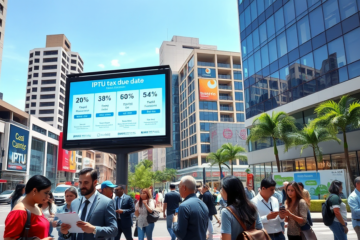Sustainable Economic Growth and Necessary Reforms
Economic Growth is a crucial topic for understanding Brazil's recent trajectory.
In this article, we will explore the main highlights of the Brazilian economy over the last three years, based on the International Monetary Fund's report.
We will analyze growth projections for the coming years, inflation trends, fiscal improvements promoted by the government, and the implications of Tax Reform.
Additionally, we will discuss the significant reduction in unemployment and poverty, Brazil's role as a leader in financial innovation, and the importance of rapidly implementing reforms to ensure inclusive and sustainable growth.
Article IV Highlights: Recent Growth of the Brazilian Economy
O IMF Report resulting from the consultation of the Article IV held in July 14, 2025 significantly highlighted the strong growth of the Brazilian economy in the years 2022 to 2024. During this period, Brazil experienced impressive expansions, reflecting not only effective economic policies but also an environment conducive to growth.
The report particularly praises the government's fiscal stimulus and reforms that boosted domestic demand and improved the business environment.
Monetary conditions, although they became more restrictive in 2025, initially allowed for economic stability.
According to the IMF report, the focus on controlling inflation and implementing a Tax Reform consolidated a more robust business environment.
Financial innovation and measures against deforestation were also key components, as highlighted by Federal Government, which contributed to sustainable and inclusive economic gains.
Furthermore, positive results included reducing unemployment and poverty, generating tangible social benefits.
- Cumulative growth above the regional average
- Productivity gains in industrial sectors
- Expansion of household consumption
GDP Projections for 2024-2025
The projections of the International Monetary Fund (IMF) indicate a significant slowdown in Brazilian GDP growth in the coming years.
For 2024, growth is forecast at 3,4%, reducing to 2,3% in 2025. Factors such as restrictive monetary conditions and growing global political uncertainty influence this slowdown.
These elements impact investor and consumer confidence, inhibiting the potential for economic expansion.
Uncertainty has repercussions on the behavior of financial markets and exchange rate volatility, exacerbating difficulties in the macroeconomic environment.
| Year | GDP (%) |
|---|---|
| 2024 | 3,4 |
| 2025 | 2,3 |
The scenario expressed in the report highlights the need to pay attention to economic stability policies and structural reforms to mitigate these effects.
This slowdown suggests a critical window for government interventions, aiming not only to contain any adverse impacts, but also to promote more sustainable growth. sustainable It is inclusive.
Inflation trajectory until 2027
The International Monetary Fund (IMF) projects that the Brazilian inflation reaches 5.2% until the end of 2025, a trajectory that reflects tight monetary conditions and global political uncertainty.
As discussed in IMF report on the Brazilian economy, inflation, initially high, is expected gradually converge towards the 3% target until 2027, promoting long-term economic stability.
This convergence trend is essential to ensure a healthy financial environment and improve companies' budget forecasting.
This inflation control will allow the government and financial institutions to correctly plan their economic interventions, mitigating the risks of economic volatility.
Furthermore, this target is essential for the effectiveness of ongoing tax reforms and for ensuring sustainable growth.
- Pressure on real family income, influencing consumption.
- High burdens on companies due to rising financial costs.
- Convergence towards the target ensures long-term economic stability.
Fiscal Advances and the Role of Tax Reform
The International Monetary Fund (IMF) expressed its recognition of the fiscal advances made by the Brazilian government in recent years.
According to the Article IV report, completed in 2025, the IMF praised Brazil for its continued efforts to improve the tax position, highlighting the government's commitment to reducing the deficit and controlling debt.
This recognition comes at a crucial time, when the global economy faces political uncertainty and restrictive monetary conditions, but Brazil has managed to maintain relatively strong growth.
Furthermore, the IMF highlights the central importance of Tax Reform in the context of Brazil's economic reforms.
This reform is seen as a historic milestone, capable of profoundly transforming the country's economic efficiency.
According to Kristalina Georgieva, managing director of the IMF, quoted in your statement, the reform has the potential to improve revenue collection and eliminate unnecessary tax waivers.
Effective implementation of this reform not only modernizes the tax system, but also provides a more balanced basis for sustainable economic growth.
In this scenario, financial innovation and combating deforestation continue to be fundamental pillars for equitable and green development, consolidating Brazil as a leader in the region.
Social and environmental progress recognized by the IMF
The International Monetary Fund recognizes Brazil's efforts to reduce unemployment and the poverty, highlighting the country's recent achievements after years of economic challenges.
The rates of unemployment experienced a significant reduction, reflected in an increase in per capita family income in real terms as described in this article on rising income in Brazil.
On the other hand, the incidence of poverty also showed a notable decline, although the challenge of combating structural inequalities persists.
These advances are crucial for inclusive progress and must be accompanied by effective policies to ensure equitable income distribution.
At the same time, the IMF's recognition extends to actions against deforestation implemented by the Brazilian government, actions that are fundamental to environmental protection and that highlight Brazil's commitment to leading the way in sustainable financial innovation.
By harmonizing the fight against unemployment, poverty and the advancement of actions against deforestation, Brazil strengthens the foundations of truly sustainable development, which is essential on the global stage.
Brazilian leadership in financial innovation
Brazil's prominent position in financial innovation has played a crucial role in the country's sustainable economic growth.
The IMF recognizes Brazil as a global leader when it comes to adopting and implementing innovative technologies in the financial sector, which includes everything from *fintech* platforms to digital payment technologies.
These advances facilitate financial inclusion, making banking services accessible to a larger portion of the population and promoting competition in the market.
Important to note is that financial innovations in Brazil have not only driven internal growth, but also attracted international attention and investment.
Tax reforms have solidified this foundation, expanding the space for innovation and highlighting the country in the global scenario of sustainable economic development.
The commitment of Brazilian authorities to the adoption of new technologies helps position Brazil as an innovation hub, capable of leading significant transformations in the global economic environment.
As emphasized by the IMF, the promotion of inclusion and efficiency are the fruits of these efforts, further strengthening the economy in the search for sustainable and inclusive growth.
Recommendations for rapid reforms and labor inclusion
The International Monetary Fund highlights the importance of a faster implementation of reforms to boost the job market in Brazil.
Structural reforms, such as those aimed at tax simplification and labor market flexibility, are seen as essential for a more attractive economic environment.
The Tax Reform, mentioned in the IMF report, seeks to increase efficiency and productivity, which are fundamental to achieving a inclusive and sustainable growth, reducing inequality and increasing the number of formal jobs.
To boost labor market inclusion, the IMF encourages the expansion of professional training programs, which are crucial for preparing workers for the demands of new economic sectors.
These actions, combined with a strong government commitment, can lead to a reduction in unemployment, as evidenced in recent years.
Additionally, promoting initiatives that aim to integrate technologies into the financial sector and combat deforestation contribute not only to environmental sustainability but also to opening up new job opportunities.
A IMF emphasis in reforms as an engine of growth highlights that, to guarantee rapid results, it is necessary to act decisively in policies that improve the employability and economic capacity of Brazilian citizens.
In short, Brazil has shown remarkable advances in its Economic Growth, but challenges still persist.
The speed of implementing reforms and inclusion in the labor market are essential to ensuring a prosperous and sustainable future for the nation.



0 Comments